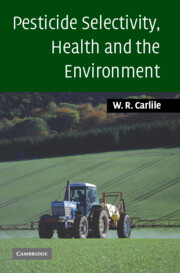Book contents
- Frontmatter
- Contents
- Preface
- Acknowledgements and permissions
- Trademarks and registered trademarks
- List of abbreviations and acronyms
- Units
- 1 The rationale, principles and regulation of pesticide use
- PART I PESTICIDES AND THEIR MODE OF ACTION
- 2 Herbicides and plant growth regulators
- 3 Fungicides
- 4 Insecticides and other compounds that control invertebrate pests
- 5 Soil sterilants, fumigants and vertebrate poisons
- PART II RISKS TO HEALTH AND THE ENVIRONMENT FROM PESTICIDES
- References
- Index
3 - Fungicides
Published online by Cambridge University Press: 03 December 2009
- Frontmatter
- Contents
- Preface
- Acknowledgements and permissions
- Trademarks and registered trademarks
- List of abbreviations and acronyms
- Units
- 1 The rationale, principles and regulation of pesticide use
- PART I PESTICIDES AND THEIR MODE OF ACTION
- 2 Herbicides and plant growth regulators
- 3 Fungicides
- 4 Insecticides and other compounds that control invertebrate pests
- 5 Soil sterilants, fumigants and vertebrate poisons
- PART II RISKS TO HEALTH AND THE ENVIRONMENT FROM PESTICIDES
- References
- Index
Summary
Introduction
Fungicides are primarily used to control plant pathogens, but are also employed for protection of timber from attack bywood-rotting fungi, and have other minor uses, for example in wallpaper pastes and paints to prevent mould growth on wallcoverings. Fungicides are also used to prevent or cure fungal infections of human beings and other animals.
Plant pathogens affect both the yield and quality of crops (Figure 3.1). In western Europe, yields of cereals may be drastically reduced by pathogens such as the leaf spot Mycosphaerella graminicola, more commonly known as Septoria tritici, on wheat, and leaf blotch (Rhynchosporium secalis) on barley and powdery mildews of the genus Blumeria, formerly known as Erysiphe, on both. Phytophthora infestans, the causal agent of late blight, may cause devastating losses in potato crops. Fruit crops may be attacked by scab (Venturia spp.) as well as powdery mildew, and fruit may be rotted in storage by a range of fungi. Protected crops frequently suffer from the grey mould pathogen Botrytis cinerea, resulting in losses of both yield and quality. In the developed world, demands by multiple retailers of fruit and vegetables for high-quality, blemish-free produce has required a high degree of control of diseases such as scabs and grey mould.
Plant diseases may also cause serious losses in subtropical and tropical countries. Yields of cereals may be reduced by rust fungi such as Puccinia graminis f. sp. tritici (black stem rust). Magnaporthe grisea, rice blast, is a major disease in South-East Asia, Africa and Latin America.
- Type
- Chapter
- Information
- Pesticide Selectivity, Health and the Environment , pp. 65 - 91Publisher: Cambridge University PressPrint publication year: 2006



